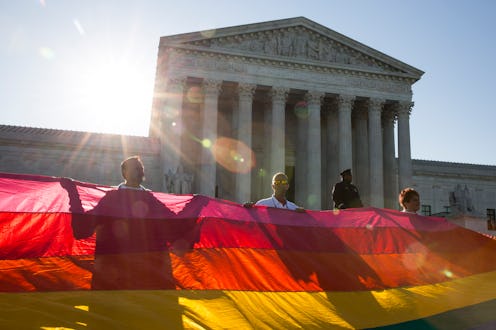News
3 Ways SCOTUS Could Rule On Gay Marriage
The Supreme Court is expected to make its landmark decision on gay marriage as early as Thursday. In deciding on Obergefell v. Hodges, which challenges gay marriage bans in four states, the Supreme Court could make gay marriage a constitutional right in all 50 states. While that is the decision that millions of same-sex couples and equal rights supporters are hoping the high court will make, there are three different ways SCOTUS could rule on gay marriage, and each one will mean a different scenario for gay couples and the states they live in. Of all the scenarios, making gay marriage a right in every state would certainly be the simplest decision.
As of now, the country is divided into multiple categories in terms of where it stands with gay marriage. There are 37 states, plus the District of Columbia, where gay marriage is legal and recognized. Of those 37 states, 20 had their gay marriage bans struck down by federal court rulings and the remaining 17 legalized gay marriage through state action. The remaining 13 states have same-sex marriage bans in place. Depending on how the Supreme Court rules, some of these states might be unaffected while others may see major changes or be faced with legal battles to overturn previous federal ruling.
After hearing oral arguments at the end of April, which left the nine justices divided — and propelled Justice Ruth Bader Ginsberg into the spotlight as a rock star supporter of marriage equality — the Supreme Court is expected to finally read its decision on Thursday. Here are the three ways in which the court could rule.
The Supreme Court Rules Gay Marriage A Constitutional Right In All 50 States
Not only would this be the best decision for social progress, it would also be the simplest transition to make overall. In one fell swoop, every ban would be struck down and same-sex marriage would be uniformly legal and recognized in every state, with no inconsistencies from state to state. Essentially, this means nothing will change for 37 states.
The Supreme Court Rules Gay Marriage Bans Are Constitutional
This would mean that the 13 states that already have bans in place will continue prohibiting gay marriage. This would leave the 20 states that legalized gay marriage through federal rulings vulnerable because marriage equality opponents would then be able to legally challenge those rulings to have bans reinstated. If certain states reinstate their bans, that would then in turn leave the couples who have already married vulnerable.
The Supreme Court Upholds Bans But Rules That All States Must Recognize Marriages Performed In Legal States
In this case, the 20 states that have federal rulings will face the same legal challenges presented in scenario number two, but the difference is that every state will be required to recognize marriages performed in any state that keeps same-sex marriage legal. Most likely, what this ruling means is a lot of traveling for same-sex couples.
Images: Getty Images (3)
